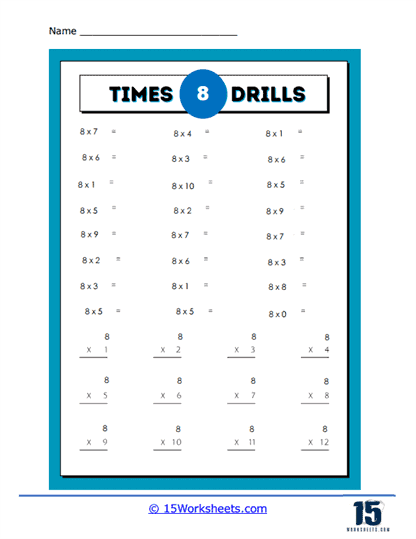8 Times Tables Worksheets
About These 15 Worksheets
These 8 Times Tables worksheets were specifically designed to help students master multiplication by focusing on the multiples of 8. These worksheets are an essential part of elementary mathematics education, enabling students to build a strong foundation in multiplication, which is critical for their future math learning. In this detailed exploration, we will delve into the various types of exercises found in these worksheets and explain how practicing with them can significantly improve a student’s multiplication skills.
8 Times Tables worksheets are not just about learning to multiply by eight; they are a comprehensive tool that aids in the overall development of a child’s mathematical abilities. By incorporating a variety of exercises, these worksheets cater to different learning styles, ensuring that all students have the opportunity to master this essential math skill. The benefits of practicing with these worksheets extend far beyond mere memorization, fostering cognitive development, problem-solving skills, and a love for learning that can last a lifetime.
Types of Exercises
Standard Multiplication Problems – The most basic form of exercises includes problems where students multiply a series of numbers by 8. For example, 8 x 3, 8 x 7, etc. These exercises are straightforward and focus on rote memorization of the 8 times table.
Fill in the Blanks – These exercises present partially completed multiplication tables or sentences where students fill in the missing numbers. For example, 8 x _ = 48, or _ x 8 = 64. This type of exercise tests the student’s ability to recall and apply the 8 times table in different formats.
Matching Exercises – In these, students are given two columns, one with multiplication problems and the other with answers. Their task is to match each problem with the correct answer. This type of exercise enhances recognition and recall skills.
Multiple Choice Questions – These worksheets present a multiplication problem along with several answer options. Students must select the correct answer from the choices given. This format helps in reinforcing knowledge and improving decision-making skills.
Word Problems – Here, real-life scenarios are presented where students must use their understanding of the 8 times table to solve problems. For instance, “If one packet contains 8 pencils, how many pencils are there in 6 packets?” Word problems help in developing analytical and application skills.
Reverse Multiplication Problems – Students are given a product and asked to find the original numbers that were multiplied to get this product. For instance, knowing that the product is 56, students determine one factor is 8 and find the other.
Timed Drills – These exercises require students to solve as many 8 times table problems as possible within a set time limit. Timed drills are effective in enhancing speed and accuracy.
Crossword Puzzles and Games – Incorporating the 8 times table into games and puzzles makes learning fun and interactive. These activities are excellent for engaging students more deeply with the material.
Benefits of Practicing
Enhances Memorization – Regular practice with these worksheets helps students memorize the 8 times table thoroughly, which is a fundamental skill in mathematics.
Builds a Strong Foundation – Mastery of the 8 times table lays the groundwork for learning higher-level multiplication, division, fractions, and even algebra.
Improves Calculation Speed – As students become more familiar with the 8 times table, their speed in solving multiplication problems increases, aiding them in tests and daily mathematical tasks.
Boosts Confidence – With increased proficiency, students gain confidence in their math skills, which can positively affect their performance in other areas of study.
Develops Problem-Solving Skills – Exercises like word problems and reverse multiplication problems enhance a student’s ability to apply mathematical concepts to solve various problems.
Encourages Independent Learning – Working through these worksheets allows students to learn at their own pace, fostering a sense of independence in their learning process.
Facilitates Quick Recall – Regular practice enables students to recall multiplication facts quickly and accurately, which is essential for efficient problem-solving.
Promotes Cognitive Development – Engaging with these worksheets stimulates the brain, enhancing cognitive skills like memory, concentration, and attention to detail.
Here are the first 15 entries of the 8 Times Tables:
8 x 1 = 8
8 x 2 = 16
8 x 3 = 24
8 x 4 = 32
8 x 5 = 40
8 x 6 = 48
8 x 7 = 56
8 x 8 = 64
8 x 9 = 72
8 x 10 = 80
8 x 11 = 88
8 x 12 = 96
8 x 13 = 104
8 x 14 = 112
8 x 15 = 120















